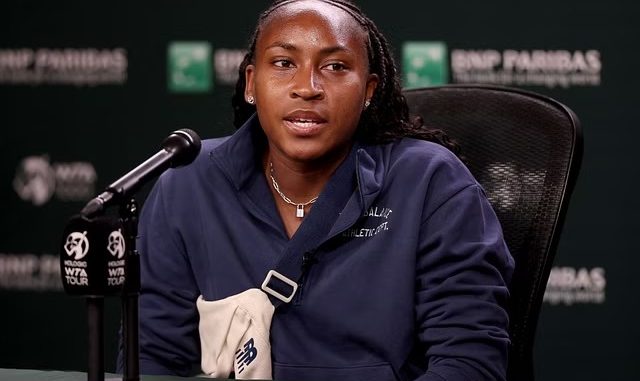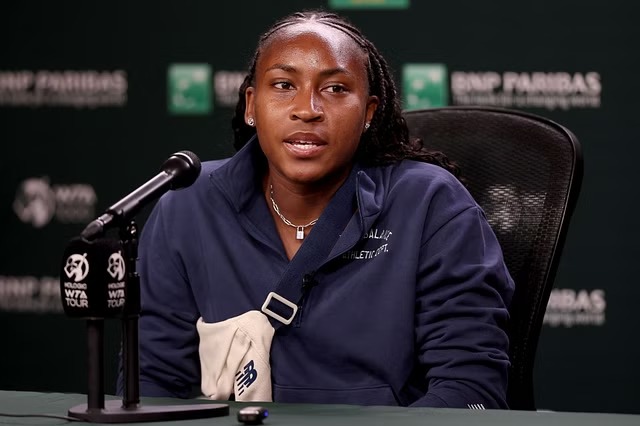
Elena Rybakina, a prominent figure in women’s tennis, recently made headlines not just for her performance on the court but for her outspoken comments directed at the media during the Roland Garros tournament. The Kazakhstani tennis star, known for her powerful play and competitive spirit, expressed frustration with the nature of the questions posed by journalists, accusing them of lacking variety and depth.

During a press conference at Roland Garros, Rybakina voiced her displeasure with what she perceived as repetitive and unoriginal questioning. She highlighted that the media seemed to focus on the same topics repeatedly, which not only frustrated her but also, in her view, failed to capture the broader nuances of her experiences and perspectives as a professional athlete. This candid critique from Rybakina sheds light on a recurring tension between athletes and the sports media.
### Context and Background
Elena Rybakina has been ascending the ranks of women’s tennis, earning recognition for her formidable skills and consistent performances. Born in Moscow but representing Kazakhstan, Rybakina has made significant strides on the WTA tour, capturing several titles and establishing herself as a formidable competitor on all surfaces.
### The Incident
The press conference at Roland Garros where Rybakina expressed her frustrations was a pivotal moment. The Grand Slam tournament, held annually in Paris, is one of the most prestigious events in tennis, attracting extensive media coverage. Athletes frequently face a barrage of questions from journalists, which can range from insightful to redundant.
Rybakina’s specific complaint was that the questions posed to her were overly repetitive, often circling around similar themes such as her previous match performances, strategies for upcoming games, and generic reflections on her form and fitness. She pointed out that these questions did not vary much from one press event to another, leading to a monotonous and uninspiring dialogue.
### Analysis of Rybakina’s Critique
Rybakina’s critique brings to the fore several issues within the sports media landscape:
1. **Lack of Depth and Insight**: The redundancy in questioning can indicate a superficial engagement with athletes. Instead of delving deeper into the athlete’s personal journey, unique experiences, and broader perspectives on the sport, the media often resorts to a set of standard questions.
2. **Athlete Burnout**: Constantly facing the same questions can contribute to media fatigue among athletes. This can affect their willingness to engage openly with journalists and may lead to more guarded and less informative responses.
3. **Missed Opportunities for Storytelling**: Journalists have a platform to explore rich narratives and offer audiences deeper insights into the lives of athletes. Redundant questioning squanders this opportunity, depriving fans of a more profound connection with the sport and its players.
### Broader Implications
Rybakina’s comments are not isolated in the world of sports. Many athletes across different disciplines have expressed similar frustrations. This reflects a broader need for the media to evolve and adopt more thoughtful and varied approaches to engaging with athletes.
1. **Enhancing Media Training**: Journalists could benefit from specialized training to develop more creative and probing questions. This would help in drawing out unique stories and insights from athletes.
2. **Athlete-Media Relations**: Improving the relationship between athletes and the media is crucial. Establishing a dialogue where athletes feel their perspectives are valued and genuinely sought after can foster more meaningful interactions.
3. **Encouraging Diverse Perspectives**: Sports journalists should aim to cover a wide array of topics, including mental health, societal issues, and personal growth stories, rather than just focusing on game-centric questions.
### Conclusion
Elena Rybakina’s outspoken critique of the Roland Garros media serves as a wake-up call for sports journalism. It underscores the need for more thoughtful, diverse, and engaging questioning that goes beyond the surface to capture the rich, multifaceted experiences of athletes. By addressing these issues, the media can better serve both the athletes and the audience, fostering a deeper appreciation for the sport and its stars.
Leave a Reply